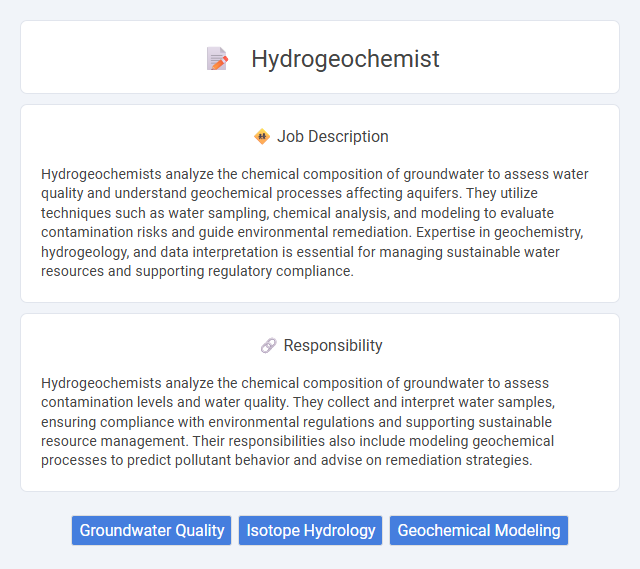
Hydrogeochemists analyze the chemical composition of groundwater to assess water quality and understand geochemical processes affecting aquifers. They utilize techniques such as water sampling, chemical analysis, and modeling to evaluate contamination risks and guide environmental remediation. Expertise in geochemistry, hydrogeology, and data interpretation is essential for managing sustainable water resources and supporting regulatory compliance.
People with strong analytical skills and a deep interest in earth sciences are likely suited for a hydrogeochemist job, as it involves studying water quality and geochemical processes. Those who can work well in field conditions, including remote and sometimes harsh environments, may find this career a good fit, while individuals preferring strictly office-based roles might find it challenging. A propensity for problem-solving and attention to detail probably increases compatibility with the demands of hydrogeochemical research and data interpretation.
Qualification
A Hydrogeochemist must possess a strong background in environmental science, geology, and chemistry, typically requiring a bachelor's or master's degree in hydrogeology, geochemistry, or a related field. Proficiency in analytical techniques such as mass spectrometry, ion chromatography, and isotopic analysis is essential for accurate water quality assessments. Experience with groundwater modeling software and knowledge of environmental regulations enhance the ability to evaluate contaminant transport and water resource management effectively.
Responsibility
Hydrogeochemists analyze the chemical composition of groundwater to assess contamination levels and water quality. They collect and interpret water samples, ensuring compliance with environmental regulations and supporting sustainable resource management. Their responsibilities also include modeling geochemical processes to predict pollutant behavior and advise on remediation strategies.
Benefit
A career as a hydrogeochemist likely offers significant benefits including opportunities to contribute to environmental sustainability and water resource management. Professionals in this field probably enjoy high demand in sectors like environmental consulting, government agencies, and research institutions, which can translate into job stability and competitive salaries. Exposure to cutting-edge scientific techniques and the chance to impact public health and policy may also enhance job satisfaction and career growth.
Challenge
Hydrogeochemist roles likely involve complex challenges related to analyzing groundwater quality and understanding contaminant transport in varied geological settings. They may face difficulties in integrating diverse chemical, geological, and hydrological data to model subsurface environments accurately. Addressing these challenges requires strong analytical skills and adaptability to evolving environmental conditions and regulatory demands.
Career Advancement
Hydrogeochemists analyze the chemical composition of groundwater to assess environmental conditions and contamination levels, utilizing advanced analytical techniques and geochemical modeling. Career advancement in hydrogeochemistry often involves progressing to senior research positions, project management roles, or specialized consultancy services within environmental agencies, mining companies, and government organizations. Gaining expertise in emerging technologies such as isotope hydrology and geospatial data analysis enhances opportunities for leadership and interdisciplinary collaboration.
Key Terms
Groundwater Quality
Hydrogeochemists specializing in groundwater quality analyze the chemical composition and properties of underground water sources to assess contamination levels and ensure safe drinking water standards. Their expertise involves sampling, laboratory testing, and interpreting geochemical data to identify pollutants such as heavy metals, nitrates, and organic compounds. These specialists play a crucial role in environmental monitoring, groundwater remediation, and sustainable resource management.
Isotope Hydrology
Hydrogeochemists specializing in isotope hydrology analyze stable and radioactive isotopes to trace groundwater flow, recharge rates, and water-rock interactions. They employ techniques such as mass spectrometry and isotopic ratio analysis to identify water sources and evaluate contamination pathways. Their expertise supports sustainable water resource management and environmental impact assessments.
Geochemical Modeling
Hydrogeochemists specializing in geochemical modeling analyze the interactions between groundwater and geological materials to predict contaminant transport and water quality changes. They utilize advanced software tools, such as PHREEQC and Geochemist's Workbench, to simulate chemical reactions and equilibria in subsurface environments. Their expertise in thermodynamics, mineralogy, and hydrogeology supports effective groundwater management and remediation strategies.
 kuljobs.com
kuljobs.com